Loose teeth if encountered in children between the ages of 6-12 are not a cause for concern, but if adults encounter this condition, they need to pay attention to the underlying cause. Whether loose teeth should be extracted or not depends on the cause and specific tooth condition because if treated promptly, the doctor will take other remedial measures to preserve the real tooth without having to extract the tooth.
1. Why are teeth loose?
There are many causes of loose teeth in adults, including the following:
1.1. Periodontitis
Periodontitis is the most common cause of loose teeth. When this condition occurs, the gums will become infected, leading to the formation of pus pockets, creating favorable conditions for bacteria to grow and develop. If not treated promptly, bacteria will attack the gums, making them no longer strong enough to hold the tooth roots firmly, causing the teeth to become loose. People with periodontitis often have the following symptoms: Receding gums, swollen gums, dark red gums, bleeding gums, alveolar bone loss, etc.
1.2. Bone loss
Bone loss is a common cause of gum recession. Bone loss is a condition in which the height and width of the bone wall is reduced, no longer able to support the gums. At that time, the gums will gradually recede, then slowly separate from the tooth roots, causing the teeth to become loose.
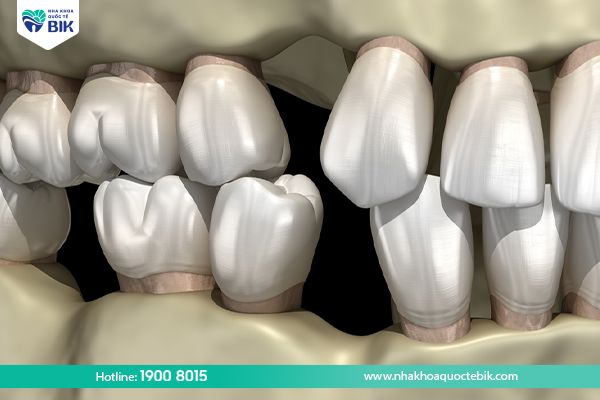
1.3. Strong impact
In case the tooth is accidentally impacted by a strong force from the outside such as biting a hard object, being injured, suddenly impacted, … it can also cause the tooth to be damaged, broken and loose.
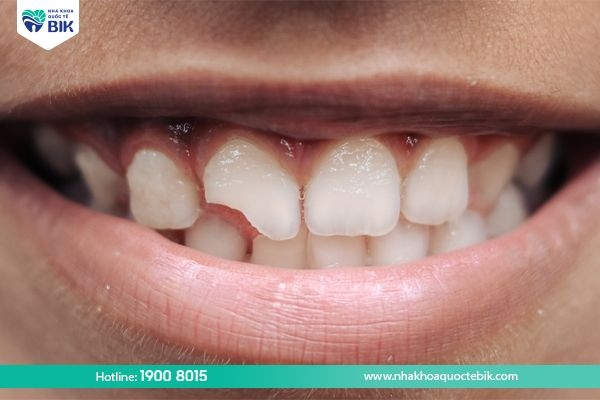
1.4. Due to bad habits
Some bad habits from childhood such as grinding teeth while sleeping cause the two jaws to clench together, easily damaging the tooth body and enamel. At the same time, this also inadvertently puts pressure on the tooth, gradually causing the tooth to be loose and painful.
1.5. Due to hormonal changes
The levels of estrogen and progesterone in a woman’s body change and can affect the gum tissue and surrounding tissues that support the teeth. In addition, the gums will also become more sensitive during pregnancy, making them susceptible to bacterial attacks and infections, making the teeth loose.
2. Should loose teeth be extracted?
In fact, the top priority in dental treatment is to preserve the real teeth as much as possible. Therefore, the doctor will only perform tooth extraction in cases where there is no way to save the tooth that has been damaged too much.
Therefore, when deciding to extract a tooth, the doctor must examine and carefully consider the damage to the tooth as well as the cause of the loose tooth. In the following cases, tooth extraction will be the most appropriate option, bringing the best treatment effect to the patient:
2.1. Severe periodontal disease
Periodontal disease is the name of the tissues around the teeth that support the teeth to exist firmly on the jaw. Untreated periodontal disease will cause the gums to recede, the ligaments to be damaged and the alveolar bone to be destroyed. From there, the connection with the teeth becomes loose and the teeth become loose.
In cases where the periodontal tissue is too severely damaged, completely losing the ability to hold the tooth root, the doctor will prescribe tooth extraction.
2.2. Severe pulpitis
The pulp is the innermost layer of the tooth covered by enamel and dentin. When the outer structure is broken, the pulp will be exposed, creating favorable conditions for bacteria to attack the inside and cause pulpitis.
This condition not only causes pain and discomfort for the patient but also causes many other serious complications such as tooth root abscess, alveolar osteitis and even jaw osteitis. If not treated promptly, the tooth root will weaken, causing the tooth to become loose and the doctor will be forced to prescribe tooth extraction to relieve the patient’s pain.
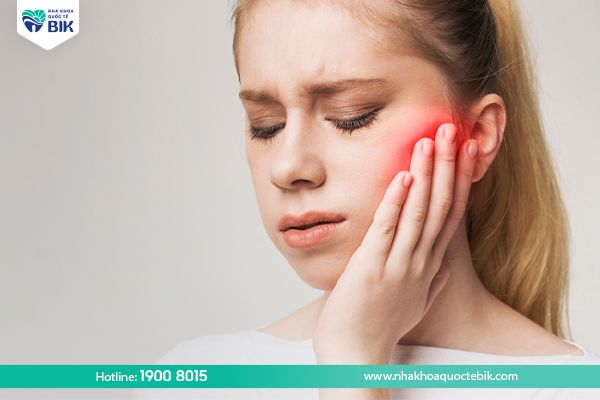
2.3. Tooth is loose due to jaw bone loss
After losing a tooth on the jaw, if not prevented by specialized measures, the jaw bone at that tooth’s location will gradually degenerate and disappear. From there, the remaining teeth around will tend to tilt into the gap of the missing tooth, gradually causing the tooth to become loose.
In this case, loose teeth often have to be extracted because the jawbone and gum tissue underneath are no longer thick enough to hold the tooth root.
2.4. Loose teeth during the tooth replacement stage
In the case of loose teeth during the baby tooth replacement stage for children aged 6-12, it will make the child quite uncomfortable and of course the teeth must be extracted promptly to make room for the permanent teeth to grow in the right place.
3. Measures to overcome loose teeth
To limit the need to extract teeth when the teeth are loose, customers need to perform early treatment, the treatment plan will depend on the cause of loose teeth:
3.1. Scaling teeth
In case of loose teeth caused by periodontal diseases, the doctor will treat them by scaling teeth to eliminate the living environment of bacteria, preventing the risk of disease.
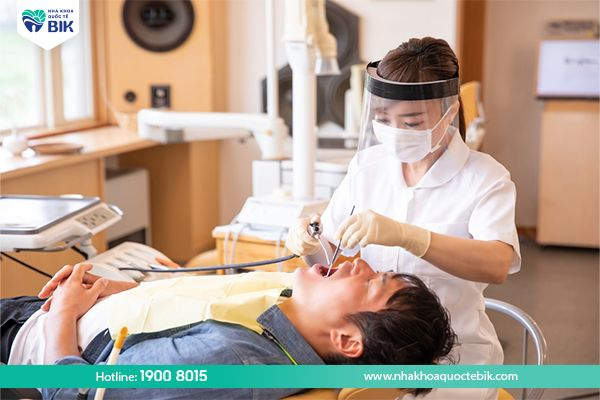
3.2. Bone grafting
If periodontitis is left untreated for a long time, it will cause the gums to recede and the alveolar bone may gradually disappear. If the bone is severely resorbed, bone grafting must be performed after the infection has been treated. Or in some cases, gum flap grafting is needed to ensure the teeth are strong.
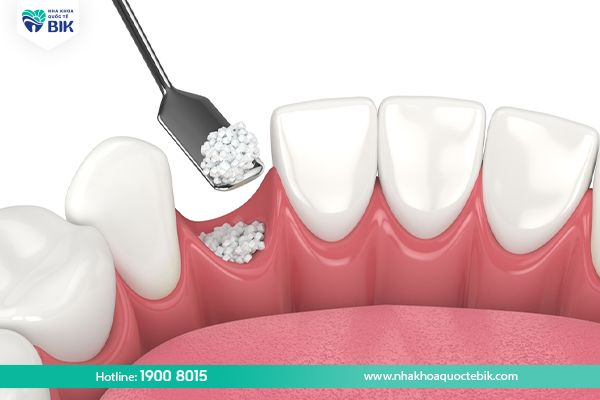
3.3. Using a fixed splint
In cases where teeth are loose due to external forces, depending on the severity, the doctor will prescribe the appropriate method. If it is mild, a splint can be used to fix the loose tooth, and after a while the tooth will become firm again.
3.4. Dental Implant
In cases where teeth are severely loose and cannot be retained and must be extracted, the customer should then have an implant denture replanted to restore chewing ability and overall aesthetics. At the same time, it effectively prevents jaw bone loss.
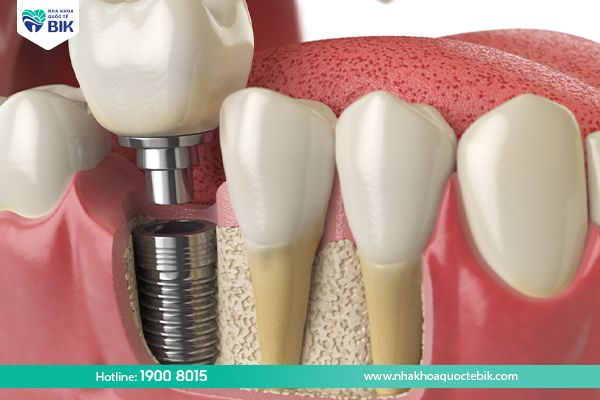
4. Effective ways to prevent loose teeth
– Brush your teeth at least twice a day, especially after each meal, to remove food plaque.
– Use a soft-bristled toothbrush with moderate brushing force to avoid damaging your gums.
– Use fluoride toothpaste to support strong teeth.
– Replace toothpicks with dental floss to remove food debris between teeth.
– Maintain a scientific diet, supplement with all necessary vitamins and minerals to support increased resistance to help the body fight harmful bacteria.
– Avoid using teeth to open water bottle caps, bite objects, …
– Limit the use of foods that are too tough, too hard, requiring too much force to bite or tear.
– Visit the dentist regularly at least twice a year to ensure regular check-ups on oral health.
So whether loose teeth should be extracted or not depends on the specific cause of loose teeth as well as the specific condition of the teeth. In case the doctor recommends tooth extraction, the customer should consider implanting dentures to restore chewing ability and effectively prevent jaw bone loss.


















